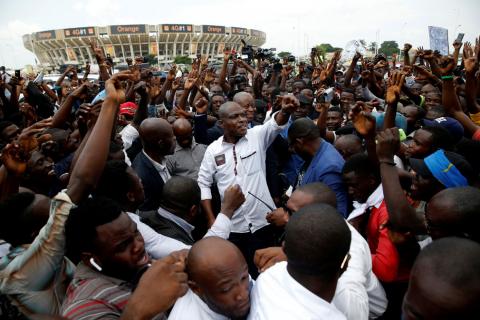Advertisement
Congo election runner-up to press fraud dispute in court
KINSHASA (Reuters) - The runner-up in Democratic Republic of Congo's presidential election said on Friday he in fact won a landslide victory with more than 60 percent of votes and will file a formal fraud complaint.
The vote was intended as Congo's first democratic transfer of power in six decades, but instead threatens to reawaken violence in the huge and tumultuous nation where millions have died during civil wars since the 1990s.
"When you know you are in the right, you are not allowed to remain home," Martin Fayulu said, urging supporters to "rise up" and contest the results with him.
Though pre-election polls predicted a landslide for Fayulu, a businessman and former manager at Exxon Mobil, the national election board, CENI, said he lost to another opposition candidate, Felix Tshisekedi, 55.
Fayulu's camp said on Friday its tally showed he won 62 percent of votes, to Tshisekedi's 19 percent.
His supporters believe authorities rigged the result in a deal to protect members of President Joseph Kabila's outgoing administration and maintain his influence over security forces.
The influential Catholic Church has also rejected the official result based on tallies by its bishops conference's (CENCO) 40,000-strong observer mission. France and former colonial power Belgium also expressed doubts.
In comments to the U.N. Security Council via teleconference on Friday, CENI president Corneille Nangaa defended the vote's credibility and attacked CENCO.
"I'd be very interested to know what party they work for," said Nangaa. "I challenge anyone to say they have the pretension to have collected all the vote tallies."
CENCO president Marcel Utembi, at the same table as Nangaa at U.N. headquarters in Kinshasa, told the Security Council the bishops' mission was independent and its conclusions were based on tally sheets representing 72 percent of ballots.
CENCO has not stated publicly who it believes won the election, but three diplomats briefed on its findings told Reuters it had determined Fayulu was the clear winner.
The head of the U.N. peacekeeping mission in Congo, Leila Zerrougui, said preliminary reports from her mission and other observers all indicated the vote "happened satisfactorily despite the technical, logistical and security problem".
Yet internal U.N. reports seen by Reuters noted allegations of irregularities across the country, including militia fighters reportedly forcing voters to select candidates from the ruling coalition. Another domestic observer mission said it witnessed vote tampering and other "major" irregularities.
"It seems important to us to exhort our partners and friendly countries to not throw fuel on the fire by speculating about the result, but to work for the consolidation of democracy and peace," said Congo's U.N. ambassador, Ignace Gata Mavita wa Lufuta.
VIOLENCE FEARED
Fayulu's camp said it would raise these issues with Congo's highest court on Saturday morning. It has asked the election board to publish results from every polling station.
"We know the Constitutional Court is composed of Kabila's people, but we do not want to give any chance to Kabila and his team to say ... you didn't follow the law," Fayulu, 62, told the BBC.
Many Congolese fear the dispute could re-start a cycle of unrest in a country where wars causing hunger and disease have ravaged the population.
Around the nation of 80 million people that is nearly the size of western Europe, there have been isolated incidents of post-election violence.
Police confronted protesters in the eastern city of Goma on Friday, killing at least one person, a Reuters witness said.
In the northern city of Kisangani, police and army responded to student protests, and in nearby Mangobo a ruling party office was set on fire, according to an internal U.N. report seen by Reuters.
These incidents followed clashes on Thursday in Kikwit in which security forces killed four protesters.
"This country has already suffered a lot from all this violence," said Kinshasa motorbike taxi driver Lambert, who declined to give his full name. "These protests should not be happening, because Tshisekedi is the people's choice."
The officially-declared winner shot to prominence when he inherited the UDPS party leadership after the death in 2017 of his father Etienne Tshisekedi.
His genial manner and resemblance to his portly father have won him support. But he lacks his experience, clout and firebrand reputation.
Before the vote, Tshisekedi said Kabila had nothing to fear should he win. Fayulu, by contrast, is backed by ex-rebel Jean-Pierre Bemba and former governor Moise Katumbi, both Kabila rivals.
"The people of the Democratic Republic of Congo have waited 58 years for a peaceful democratic transfer of power, and have sacrificed too much for this election result not to reflect their votes," said a bipartisan group of U.S. Senators.
(Reporting by Stanis Bujakera and Giulia Paravicini in Kinshasa; additional reporting by Aaron Ross and Juliette Jabkhiro in Dakar and Rodrigo Campos in New York; Writing by Edward McAllister and Aaron Ross; Editing by Andrew Cawthorne and Robin Pomeroy)



















Add new comment